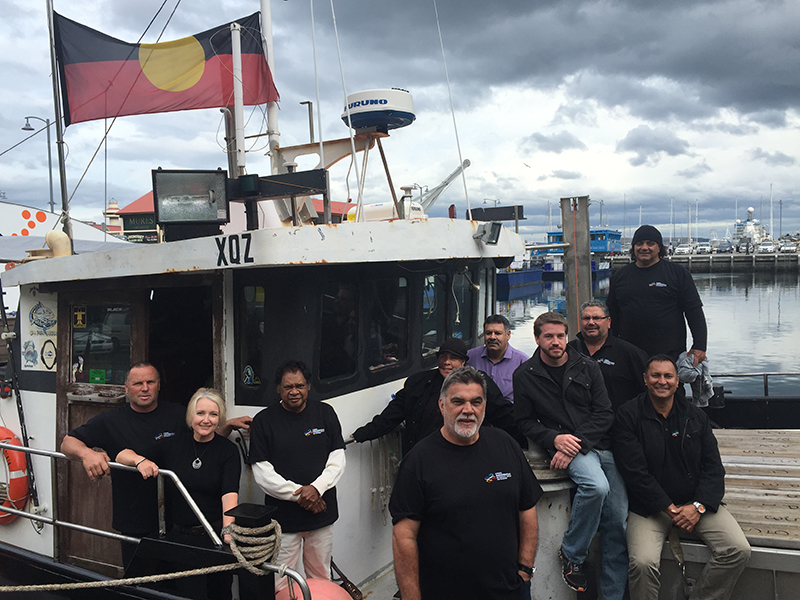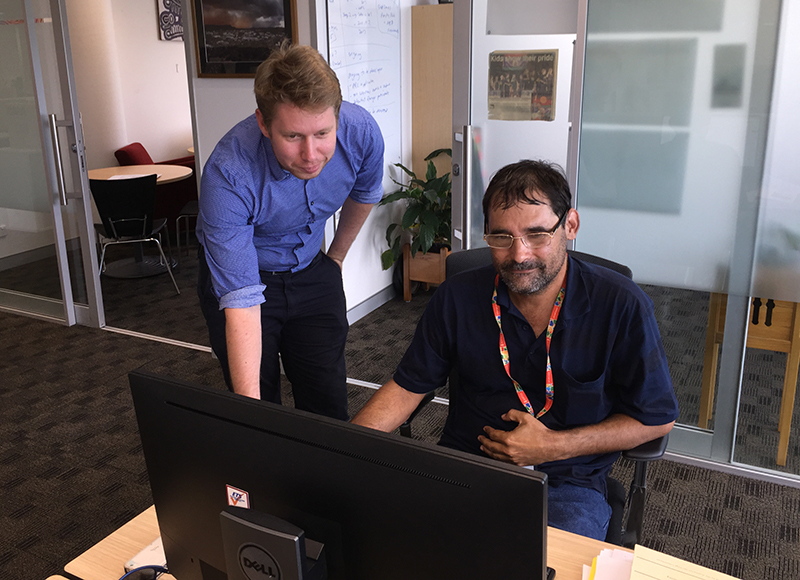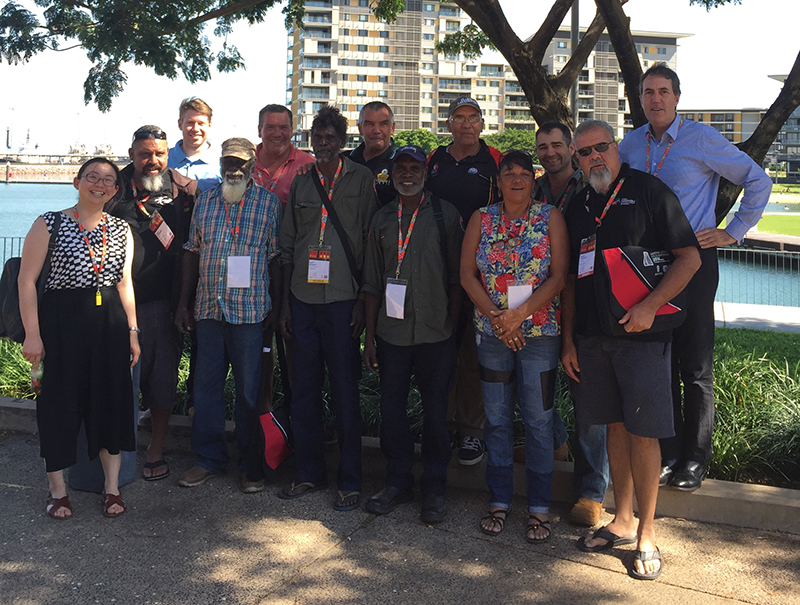For the full project report, see Luke Smyth, Hayley Egan and Rod Kennett, Livelihood values of Indigenous customary fishing: final report to the Fisheries Research and Development Corporation (2018).
Context
While the importance of fishing as a way of life is obvious to many Aboriginal and Torres Strait Islander people, there have been few attempts to translate their experiences into a narrative that governments, non-Indigenous fishers and the general public can immediately understand and appreciate.
Government policy concerning fisheries management doesn’t often take Aboriginal and Torres Strait Islander people and communities into account. In non-Indigenous commercial and recreational fishing sectors, the value of a catch is quantifiable in both direct and indirect ways. It is easy to see the economic value of selling fish and seafood. Recreational fishing undertaken by the tourism industry also holds economic and cultural value.
The value of Aboriginal and Torres Strait Islander customary fishing is less clearly quantifiable. One example of this is the cultural value of spiritual relationships with and access to marine territories and sacred sites. Aboriginal and Torres Strait Islander values, particularly social and economic values, are often conspicuously absent in the development of fishing management strategies and policies.
Part of this is because many people incorrectly assume that customary fishing and commercial fishing can’t overlap, or that contemporary Aboriginal and Torres Strait Islander commercial fishing somehow isn’t ‘traditional’. In fact, customary fishing has always had an economic element as Aboriginal and Torres Strait Islander peoples fished to survive and to trade.
Plenty of Aboriginal and Torres Strait Islander commercial fishers use Indigenous cultural knowledge and practices they learnt from family and Elders in their work, and are proud of making a living on their country and using their culture and resources. For many communities the commercial fishing that happens today is a continuation of what their ancestors did prior to colonisation, with their fishing practices adapting over time to the changing cultural and economic environment:
‘We were made out to be criminals, and we weren’t even criminals, it was who we were, it’s in us, it’s culture, our way of life; if we could make some money out of it we should’ve gotten that opportunity too. We had trade and barter before they came along, in traditional times they bartered. But they just expect that blackfellas, if you want to go fishing, go fishing in a canoe.’ — Wally Stewart, Yuin native title claimant and cultural fishing advocate, 2016
For government and regulatory bodies to be able to take Indigenous customary fishing values into account when developing fisheries management policies, these values need to be clearly articulated and able to be interpreted.
What did we do?
In July 2015 AIATSIS was successful in winning a competitive research grant from the Fisheries Research Development Corporation (FRDC) to carry out a collaborative project on Indigenous values in fisheries in northeast Arnhem Land, the South Coast of New South Wales and the Far West Coast of South Australia.
The Livelihood values of Indigenous customary fishing project qualitatively documents the cultural and socio-economic value of Indigenous customary catches. Customary fishing has more than a purely economic value; it also brings communities together. Through this project, we aim to make these values accessible to government and regulatory bodies.
An increased understanding of the values Aboriginal and Torres Strait Islander people place on customary fishing will ensure that policy-makers involved in fisheries management planning are able to better appreciate why these values should be taken into account when negotiating catch allocations and access to waters. It will also increase the likelihood of collaborative – not combative – approaches to fisheries research and management of aquatic resources.
This research is also valuable for non-Indigenous fishers and the general public who may also find it difficult to understand and appreciate the importance of fishing, as well as land and sea management regimes to Aboriginal and Torres Strait Islander people and communities.
Who was involved?
The project involved three coastal Aboriginal communities with different cultures, environments, fisheries activity and economic and legal contexts. The organisations we worked with were:
- The NSW Aboriginal Fishing Rights Group on the New South Wales South Coast,
- The Far West Coast Aboriginal Corporation in southwest South Australia, and
- The Crocodile Islands Rangers, run by the Milingimbi & Outstations Progress Resource Association of northeast Arnhem Land.
In each region, we talked to community experts in fishing and managing aquatic resources. The different fisheries issues, languages and literacy levels meant our researchers worked with each community to identify their needs and to create effective and appropriate questions and tools. In the end, we chose three face-to-face methods of collecting data about people’s values: short questionnaires, individual interviews and focus group interviews.
What did we learn?
People’s responses fit into four main categories: values, barriers, effects and aspirations. Values are benefits that people get from fishing and the reasons why fishing is important to them. Barriers are anything that stops or makes it difficult for people to fish the way they want to, such as trouble getting access to fishing spots. Effects are the consequences of the barriers for people and their communities, including things like low self-esteem from being unable to fulfil cultural obligations. Aspirations are what people want from fishing for themselves and their communities in the future; for instance, wanting to have more young Aboriginal people involved in commercial fishing.
The separate cultural, social and economic contexts of each region mean there are differences in people’s values, barriers, effects and aspirations. However, there are common values:
- fishing is a central part of people’s lives and cultures,
- fishing is one of the main ways of passing knowledge and culture down to children,
- fishing helps people maintain their connection to country,
- fishing allows people with low incomes to provide their family with a healthy diet,
- fishing is rarely done alone; it’s an important family and community bonding activity,
- fishing means sharing your catch, which provides a safety net for vulnerable people, and
- fishing means only taking what you need and preserving resources for future generations.
You can find more about the values, barriers, effects and aspirations identified in each case study in the respective case studies.
Project sponsor
The Fisheries Research and Development Corporation (FRDC) is a co-funded partnership between the Australian Government and the fishing industry. Its role is to plan and invest in fisheries research, development and extension (RD&E) activities in Australia.
In 2012, the FRDC established an Indigenous Reference Group (IRG) to assist in working towards a fisheries and seafood industry RD&E plan for Aboriginal and Torres Strait Islander people.
The IRG is expertise-based, advisory in nature and makes recommendations to the FRDC on strategic issues relevant to Aboriginal and Torres Strait Islander RD&E in the fishing and seafood industry. The scope of the IRG is to ensure that this RD&E assists in delivering improved economic, environmental and social benefits to Australia’s Aboriginal and Torres Strait Islander peoples.

The Indigenous Reference Group members on board one member’s commercial fishing boat in Hobart. Photographer: Gail Calogeras, courtesy of Chris Calogeras.
The Indigenous Reference Group members on board one member’s commercial fishing boat in Hobart. Photographer: Gail Calogeras, courtesy of Chris Calogeras.
The IRG recognises five overarching RD&E priorities:
- Primacy for Indigenous people,
- Acknowledgement of Indigenous cultural practices,
- Self-determination of Indigenous rights to use and manage cultural assets and resources,
- Economic development opportunities arising from Indigenous people’s cultural assets and associated rights, and
- Enhanced capacity-building opportunities for Indigenous people.
The IRG provides support for a number of projects related to its work, including AIATSIS’ research project into fishing values. Most of these projects relate to Aboriginal and Torres Strait Islander business development opportunities and impediments in the fishing and seafood industry, as well as the integration of traditional fishing and ecological knowledge in fisheries management.

